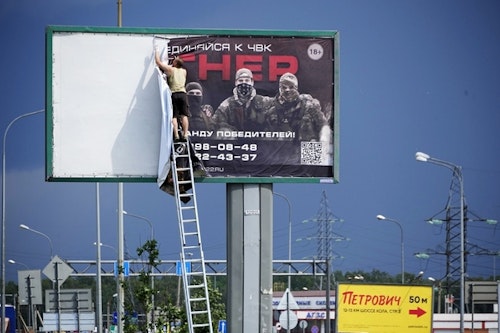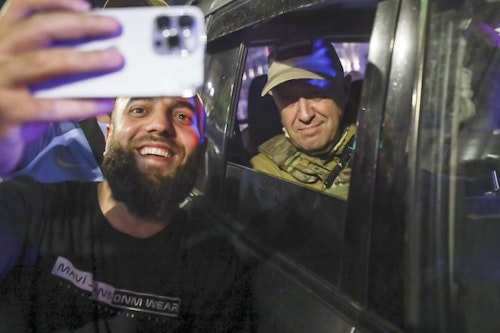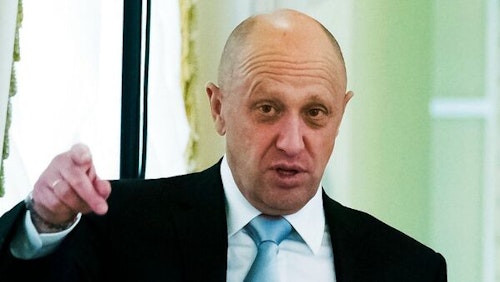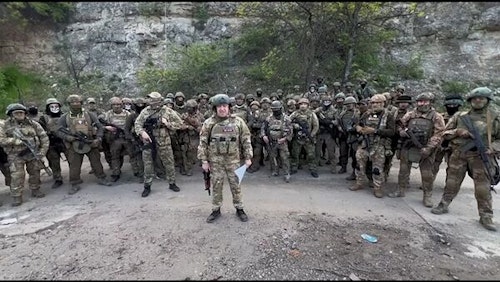A brief revolt saw Wagner Group soldiers under Yevgeny Prigozhin's command move unimpeded into the Russian city of Rostov-on-Don and advance toward Moscow before abruptly turning back.
The head of the private Russian military company Wagner, Yevgeny Prigozhin, will move to neighbouring Belarus as part of a deal to defuse tensions and the criminal case against him will be closed, it was announced last night.
 ADVERTISEMENT
ADVERTISEMENT
 ADVERTISEMENT
ADVERTISEMENT
Prigozhin's sudden move towards Moscow briefly threw the immediate future of the Putin government into question, but it was only a matter of hours before the agreement was struck and his troops turned back.

 ${title}
${title}
Live ended
That's the end of our live weekend coverage of the ongoing - and often puzzling - events that have taken place in Russia with an apparent attempted coup that fizzled out not long after it started. Here's what you need to know, and read below to see how everything unfolded:
- Wagner paramilitary forces led by boss Yevgeny Prigozhin first took control of the Russian city of Rostov-on-Don and then began driving north on the main highway towards Moscow.
- New security measures were put in place in the capital, and local residents were told not to travel.
- The Kremlin accused the boss of private paramilitary company Wagner of attempting to stage a coup. Prigozhin insisted his forces were "patriots" who had the support of the Russian people because of the mishandling of the war in Ukraine
- Before Wagner forces reached Moscow, it was announced that a deal had been struck for Prigozhin to abandon his apparent plan leave Russia for Belarus in exchange for the lifting of criminal charges against him.
- The deal appeared to defuse a dramatically escalating crisis that represented the most significant challenge to President Vladimir Putin in his more than two decades in power.
- Ukrainian President Volodymyr Zelenskyy said the episode proved that in Russia there's "so much chaos, no lie can hide it."
McFaul: Russia "must have known" about mutiny in advance
Speaking on US network MSNBC this morning, former US ambassador to Moscow Michael McFaul – one of the most-followed commentators on the Ukrainian conflict – remarked that if it is true as reported that US intelligence got wind of Prigozhin's attack months ago, it follows that Russian intelligence almost certainly knew about it too.
Here are his remarks:
When Prigozhin denied he would stage a coup
It was only a few weeks ago that Wagner's Yvgeny Prigozhin explicitly said he was not planning to overthrow Vladimir Putin, even as he continued his stream of public insults against the Ministry of Defence and its mishandling of the invasion of Ukraine.
The US-based Institute for the Study of War reported that Prigozhin had argued his mercenary force could not topple the Kremlin because it lacked the manpower, following a claim by former Russian military commander Igor Girkin it wanted to do so.
Here's our writeup from last month.
Taking down Wagner recruitment posters
The Wagner group has been recruiting heavily in Russia since the invasion of Ukraine, in which it has played a crucial role – but after this weekend's events, its billboards look set to be less of a feature of Russia's urban landscape...

Shoigu goes to ground
Vladimir Putin and Sergei Shoigu have sunbathed together shirtless in remote Siberia, shared fishing trips and played in the same ice hockey team. The Russian Defence Minister has long been regarded not only as a political ally of the President, but also as one of his few friends among the Russian elite.
However, their relationship now faces a considerable challenge following the Wagner group revolt – as does Shoigu's long political career
Shoigu has disappeared from the public eye for the time being, going quiet as Prigozhin successfully seized the headquarters of the Russian army's Southern Command in Rostov-on-Don, the nerve centre of the invasion of Ukraine. Before the deal with Belarus was struck, Prigozhin accused Shoigu of fleeing "like a coward" and vowed that he "would be arrested".
But even before the uprising broke out on Friday evening, Shoigu had suffered myriad public insults from Prigozhin, and was increasingly associated with the Russian military's failures in Ukraine.
On 12 June, a video of Putin and Shoigu attending a medal ceremony in a military hospital showed the Russian president turning his back on him with apparent contempt – a cruel disgrace for the man who has enjoyed unrivalled longevity in post-Soviet Russia, and whose presence at the heart of power in Moscow predates even Putin's. (AFP)
Blinken: Wagner coup reveals fissures in Russian power structure
US Secretary of State Antony Blinken has been doing the media rounds on the American Sunday morning news shows, and is naturally answering questions about the meaning of yesterday's action by the Wagner group. Here's the assessment he gave to CNN:
Belarusian opposition leader decries Prigozhin deal
Sviatlana Tsikhanouskaya, who has been exiled from Belarus since she ran against and quite possibly defeated Alexander Lukashenko in the country's 2020 election, has weighed in on the deal that will see her country hosting Yvgeny Prigozhin in return for the dropping of Russian charges against him:
Russia says it fought off new Ukrainian assaults
Russia claimed on Sunday to have repelled several assaults by Ukrainian forces in eastern Ukraine, where Kyiv announced yesterday evening that it had launched new offensives and was making progress.
The Russian army "successfully repelled" attacks in four areas of the front, notably in the Donetsk region, but also in Zaporizhzhia, the Russian defence ministry said in a statement, adding that ten of these attacks had been repelled near Bakhmut.
Zaporizhzhia is of particular importance because it is host to Europe's largest active nuclear power plant, which is occupied by Russian troops and which Volodymyr Zelenskyy has warned Russia may be planning to sabotage with potentially disastrous consequences. (AFP)
Prigozhin's whereabouts still unclear
There are still no reports of mercenary leader Yevgeny Prigozhin arriving in Belarus after he reached a deal with the Kremlin to go into exile and ended his rebellion.
Many other questions remained unanswered on Sunday morning, including whether Prigozhin would be joined in exile by any of his Wagner Group’s troops and what role, if any, he might have there.
Prigozhin, who sent out a series of audio and video updates during his revolt, has gone silent since the Kremlin announced that the deal had been brokered for him to end his march toward Moscow and leave Russia.
Meanwhile, life in Moscow appears oddly normal. There is little sign of the counterterrorism alert that nominally remains in place after Yevgeny Prigozhin launched his revolt. Crowds swarmed the downtown area of the Russian capital on a sunny day and street cafés were packed with customers. Traffic had returned to normal and roadblocks and checkpoints were removed. (AP)
North Korea backs Kremlin after Wagner mutiny
The government of North Korea has offered its full support to Russia after the mutiny by the Wagner paramilitary group, state media reported on Sunday.
At a meeting with the Russian ambassador to Pyongyang, North Korean Deputy Foreign Minister Im Chon-Il "expressed his firm belief that the recent armed rebellion in Russia would be successfully suppressed", North Korea's KCNA news agency reported.
North Korea has described the circumstances of the Ukrainian conflict as a US "proxy war" aimed at destroying Russia, and has condemned Western military aid to Kyiv.
As a permanent member of the UN Security Council, Russia has long vetoed new sanctions against North Korea over its nuclear programme and repeated missile launches. (AFP)
Wagner leaves Lipetsk
The forces of the Russian paramilitary group Wagner have left the Lipetsk region, south of Moscow, where they entered on Saturday on their aborted drive towards the Russian capital, the local authorities announced on Sunday.
"The units of the Wagner paramilitary group, which stopped yesterday in the Lipetsk region, have left the territory," the regional authorities' press service said on Telegram.
The regional capital of Lipetsk is 400km from Moscow. (AFP)
Questions about Putin's power
The Wagner revolt has exposed vulnerabilities among Russian government forces. Soldiers under the command of Yevgeny Prigozhin were able to move unimpeded into the Russian city of Rostov-on-Don and advance hundreds of kilometres toward Moscow as the Russian military scrambled to defend the capital.
Putin's relative weakness is also demonstrated by the deal announced Saturday by Kremlin spokesman Dmitry Peskov, under which Prigozhin will go to neighbouring Belarus while charges punishing him for mounting an armed rebellion will be dropped.
The government also said it would not prosecute Wagner fighters who took part, while those who did not join in were to be offered contracts by the Defense Ministry. Prigozhin ordered his troops, many of whom had been fighting alongside Russian regular soldiers in Ukraine, back to their field camps.
A US-based think tank argued that Prigozhin’s rebellion “exposed severe weaknesses” in the Kremlin and the Ministry of Defense.
The Institute for the Study of War said that the Kremlin struggled to put up a coherent response to the rebellion, and that one reason was likely the impact of heavy Russian losses in Ukraine.
“Wagner likely could have reached the outskirts of Moscow if Prigozhin chose to order them to do so,” the institute said. (AP)
Prigozhin poses for selfie
As he left Rostov-on-Don last night in a sleek black car, Yevgeny Prigozhin posed for selfies with locals who seemed to be enthusiastic about his ersatz coup even after it had been called off.

Russian media shared video of his departure, which came after the news that he had struck a deal with the Kremlin and Belarusian autocrat Alexander Lukashenko:
Chinese Foreign Minister Qin Gang received Russian Deputy Foreign Minister Andrei Rudenko in Beijing on Sunday, according to Chinese officials, in the first public meeting between diplomats from the two countries since the armed rebellion by the Wagner group.
The two men discussed "Sino-Russian relations and international and regional issues of common interest", the Chinese Foreign Ministry statement said, without giving any further details and without specifying whether the previous day's events in Russia had been discussed.
China's position on the Ukrainian conflict has been largely ambiguous, leaving western observers concerned that Beijing could yet offer Russia game-changing support – this as the Chinese military has steadily ramped up tensions over Taiwan. (AFP)
"Anti-terror measures" still in force in Moscow
The "anti-terrorist operation regime" introduced in Moscow and the surrounding region after the mutiny by the paramilitary group Wagner remains in force, despite Yevgeny Prigozhin's U-turn.
This regime gives greater powers to law enforcement. For example, large sections of the motorway linking Rostov to Moscow have been blocked, and identity and vehicle checks have been introduced on the roads. The mayor of Moscow, Sergei Sobyanin, decreed that Monday would be a day off in view of the "difficult" situation.
Large police patrols were still deployed along the main road leading out of Moscow in the south of the capital. (AFP)
White House "wary" of weighing in too heavily
US President Joe Biden spoke with French President Emmanuel Macron, German Chancellor Olaf Scholz and British Prime Minister Rishi Sunak on Saturday about the situation in Russia. According to a statement from the White House, the four leaders reaffirmed their “unwavering” support for Ukraine during the conversation. However, the White House said American officials were wary of weighing in further on the situation and "wanted to avoid any comment that could be misconstrued to suggest the US was taking a side in the apparently internal conflict.” (AP)
Zelenskyy: Wagner incident reveals depth of Russian chaos
In a stark analysis of the meaning of yesterday's mutiny, Ukrainian President Volodymyr Zelenskyy gave a withering assessment of the state of the Russian government while also calling for determined international support in fighting the Putin regime. "It's time for everyone in the world to frankly say that all of Russia's criminal actions against Ukraine were and are unprovoked," he tweeted.
Here's what he had to say:
Intelligence casts doubt on Prigozhin's narrative
Yevgeny Prigozhin has said his march toward Moscow was a response to an attack on his camps in Ukraine on Friday by rival forces from the Russian military. However, it has emerged that the US is in possession of intelligence that he had been building up his Wagner forces near the border with Russia for some time.
Officials briefed congressional leaders known as the Gang of Eight on the buildup earlier in the week, a person familiar with told the Associated Press on the condition of anonymity. The briefing was first reported by CNN.
The military preparations raise questions about Prigozhin’s explanation for why he sent his forces into Russia and whether he had instead long been planning a challenge to Russia’s military leadership. He has increasingly criticised Russia's military top brass, accusing them of incompetence and of starving his troops of munitions even as they remain crucial to the struggling war effort. (AP)












